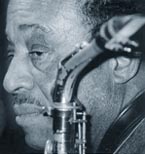
|
|
|
|
|
|
Photo Credit: Jeffrey Kliman |
Lou Donaldson
Some of the absolute best episodes of Billy Taylor's Jazz at the Kennedy Center document Dr. Taylor inviting one of his true peers to the bandstand. Such is the case when he warmly welcomes the masterful and oft underrated veteran of the alto saxophone, Lou Donaldson, to the Terrace Theatre stage. Dr. Taylor's joy in hosting a fellow traveler who has withstood the test of time is clear in his opening remarks. He introduces Donaldson as a bebop survivor who was also in the vanguard of the so-called "soul-jazz" movement of the 1960s and 1970s. And throughout our show, Donaldson proves Dr. Taylor's assertion that "no matter what he plays, Lou Donaldson makes everything swing." During the 1930s when so many jazz musicians emerged from the academy of the streets, Donaldson was one of the exceptions: a college-trained jazz musician. Donaldson tells Dr. Taylor about his youthful days in North Carolina at Greensboro A&T College and about the fine musicians, among them trumpeter Irvin Stokes, in the college band. Fortunately, proximity to a military base in Greenville afforded Donaldson the opportunity to test his mettle in jam sessions with such soon-to-be vital talents as saxophonist James Moody and arranger-composer Walter "Gil" Fuller. Although earlier swing- and blues- alto players such as Johnny Hodges, Pete Brown, Earl Bostic and Tab Smith were among his earliest influences; like many, Donaldson was struck by the comet from Kansas City in the early '40s: Bird. "When I heard Charlie Parker . . . he took me out," Donaldson enthuses. Talk of Parker prompts Dr. Taylor to call the tune "Ornithology," a piece largely associated with Bird but actually written by trumpeter "Little" Benny Harris. Abetted by Dr. Taylor's trio, Donaldson swings on "Ornithology" with the unmistakable gusto and know-how of a veteran. Donaldson did not just pop out of the cradle a fully formed saxophonist. Music lessons, primarily delivered by his no-nonsense, piano-playing mother, were part of his home routine. In one of several humorous anecdotes, Donaldson tells Dr. Taylor and our laughing audience how he wound up disliking the piano. His mom was a strict disciplinarian about music lessons, Donaldson says, and she often whacked his knuckles with a switch if he made mistakes. "I hated piano. That's why I don't play it today." But his mother recognized his talents early on, nurtured them, and started her young son down the wind instrument road with a clarinet. During the ever-popular audience Q&A portion of the show, Donaldson tells an audience member how his biggest hit, "Alligator Boogaloo," was made up on-the-spot to fill out a record date. Dr. Taylor asks Donaldson what it was like to record at that hotbed, jazz record label, Blue Note Records; and Donaldson, recounting a recording studio encounter with Thelonious Monk, again cracks up the crowd. Asked about the very first Jazz Messengers gig that included Art Blakey, Horace Silver and Clifford Brown, Donaldson is emphatic: "Billy, I'd have worked that job for no money . . . that was the greatest group." Other tunes on the show include: "Wee;" "Getting Sentimental Over You;" "Blues Walk;" the hilarious "Whiskey Drinking Woman;" and a brisk, closing "Cherokee."
|
|
| |
